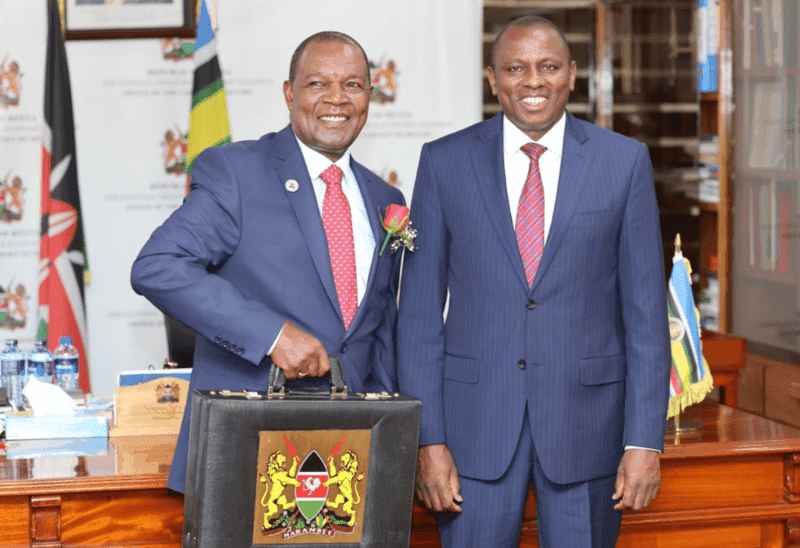We're loading the full news article for you. This includes the article content, images, author information, and related articles.
The Kenyan government has unveiled a massive KSh 4.29 trillion budget for the 2025/26 fiscal year, pinning its hopes for economic revival on the "Bottom-Up Economic Transformation Agenda."

Here’s an enhanced and more compelling version of your budget article, written to engage readers, clarify the stakes, and communicate the broader vision behind the numbers:
Nairobi, Kenya — June 12, 2025
In a bold declaration of intent, the Kenyan government has tabled a KSh 4.29 trillion budget for the 2025/26 fiscal year — one of the most expansive and strategically targeted financial blueprints in the country’s history. Announced on June 12 against a backdrop of economic pressure and public demand for accountability, the budget is anchored on the Bottom-Up Economic Transformation Agenda (BETA) — a sweeping initiative designed to ignite development from the grassroots level upward.
At its heart, this budget isn’t just a set of numbers; it’s a national roadmap — a high-stakes financial gamble aimed at reengineering Kenya’s economic foundations, stimulating widespread job creation, and building lasting prosperity.
Topping the budget is the education sector, which receives a historic KSh 702.7 billion — the largest single allocation across all sectors. This significant investment signals the government’s recognition of education not only as a social equalizer but as a pillar of national transformation.
The funding will support infrastructure development, digital learning tools, teacher recruitment, and reforms aimed at aligning curricula with future job markets. By prioritizing schools and institutions of higher learning, the administration is effectively betting on the youth as the architects of Kenya’s future.
Trailing closely behind is the security sector, which receives KSh 464.9 billion. These funds will go toward strengthening the police service, modernizing the Kenya Defense Forces, and enhancing intelligence operations. Amid rising concerns about regional instability and internal dissent, the allocation underscores the government’s view that economic growth cannot thrive without national stability.
While critics may question the magnitude of the security spend, government officials argue it is vital for safeguarding citizens, defending borders, and protecting the infrastructure and investments tied to the transformation agenda.
The budget also demonstrates a continued focus on infrastructure, with KSh 318.1 billion allocated to projects in transportation and energy. Roads, railways, and electricity access — especially in rural areas — are expected to receive a boost, aiming to reduce the cost of doing business, attract investment, and connect marginalized regions to economic opportunities.
These projects, officials say, are not vanity efforts but strategic enablers for small businesses, farmers, and manufacturers who form the backbone of the BETA vision.
A notable portion of the budget has been earmarked for county governments and social programs, further solidifying the government’s commitment to equitable and inclusive development. By channeling resources to local authorities and strengthening social safety nets, the administration hopes to bridge regional disparities and ensure that no community is left behind.
Healthcare, agriculture, affordable housing, and digital access programs are all set to benefit — part of a multi-layered strategy to widen economic participation and reduce inequality.
With this budget, the Kenyan government is playing a long game. The scale of spending signals confidence — but also exposes the country to fiscal pressure. Questions remain about the sustainability of borrowing, the efficiency of fund utilization, and the integrity of procurement processes.
Nonetheless, President William Ruto’s administration appears convinced that the short-term risks are worth the potential long-term payoff: a revitalized, self-reliant economy that works for the many, not just the few.
“This is not just a budget — it is a transformation agenda in motion,” said Treasury Cabinet Secretary Prof. Njuguna Ndung’u during his address. “We are investing in people, productivity, and purpose.”
As implementation begins, all eyes will be on execution. Will the funds reach their intended targets? Will the education reforms take root? Will infrastructure projects create jobs or stall in bureaucracy? Will grassroots enterprises find the support they’ve been promised?
The answers to these questions will shape Kenya’s socioeconomic trajectory for years to come. For now, one thing is clear: the government has placed its
Keep the conversation in one place—threads here stay linked to the story and in the forums.
Sign in to start a discussion
Start a conversation about this story and keep it linked here.
Other hot threads
E-sports and Gaming Community in Kenya
Active 9 months ago
The Role of Technology in Modern Agriculture (AgriTech)
Active 9 months ago
Popular Recreational Activities Across Counties
Active 9 months ago
Investing in Youth Sports Development Programs
Active 9 months ago